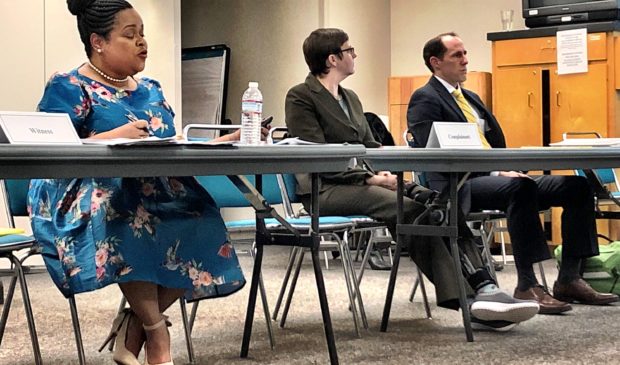Ethics Review Commission dismisses case against Human Resources director
Thursday, February 14, 2019 by
Jessi Devenyns The city of Austin professes to have a “mother-friendly” work environment that supports new moms and working parents. However, a complaint filed in December by the Office of the City Auditor brings that policy into question.
The complaint filed by Brian Molloy, chief of investigations for the city auditor’s office, alleges that Joya Hayes, director of the city’s Human Resources Department, misused city resources and abused her position by directing staffers to care for her child while she performed work-related duties. The complaint noted “multiple allegations of abuse and waste.”
In a statement, Hayes refuted the allegations and condemned the expectations that suggest “a city employee is always considered on duty, always considered a city resource and executives are prevented from establishing any level of personal relationships, even if those relationships take place outside of normal working hours.”
During a preliminary hearing on the matter at its Feb. 13 meeting, the Ethics Review Commission heard the evidence and then voted to dismiss the case 8-1-1. Commissioner Donna Beth McCormick opposed the dismissal and Commissioner Brian Thompson abstained from the vote.
As Carol Guthrie, the business manager for the American Federation of State, County and Municipal Employees, told the ethics commission, “Day care is a big problem in this city … We support 100 percent the city of Austin maintaining its family-friendly organization and hope that they will expand on that.” AFSCME, the union representing city employees, does not act for executive-level employees in the city.
The auditor’s office noted that since Hayes began as interim HR director in May 2015, they found eight instances of alleged code violations involving five employees from her department. Molloy said “there might be more,” but noted that when the auditor interviewed HR employees, a “substantial” number of witnesses said they were afraid of retaliation if they cooperated with the investigation.
Hayes replied that this direct interpretation of code was “ridiculous” and “de minimis in use.” She explained that in her 19 years of service, she had never been written up and that she only accepted child care help – such as a few hours of babysitting or dropping her son off at day care – from her colleagues in “unexpected moments” outside of work hours. The auditor’s office was unable to refute this claim except in one case when an HR employee picked Hayes’ son up from day care on her lunch hour, which they agreed was not city time.
Hayes, who is African-American, received a standing ovation from a packed room for her opening arguments.
Following the evidence, Commissioner J. Michael Ohueri asked whether the auditor’s office had considered different cultural norms when it comes to socialization and helping colleagues. He suggested that there are communities where help is not necessarily given with the expectation of future gains for good deeds.
“I’m not calling anyone here or anyone at your office racist,” he said. “(However), if up to this point you have not considered the impact of race, that certainly is a failure.”
Just prior to the preliminary hearing, Mayor Steve Adler posted on the City Council Message Board that at its March convocation, City Council will be considering “whether action should be taken against certain non-civil service employees for whom the Auditor has issued an investigation report alleging a breach of ethics,” and if so, whether that is the duty of the city manager or the Ethics Review Commission. Giving that responsibility to the city manager would entail any report or complaint remaining out of the public eye “until after the city manager had determined whether or not to take action.”
Although this seems to reduce the transparency of the ethics process, Adler’s proposal does seek to relax the rules related to employees helping each other.
Several commissioners asked if the auditor’s office was able to prove that quid pro quo occurred in consequence to any of the child care favors that Hayes’ employees performed. The auditor’s office said that they would look into that if the case proceeded to a final hearing.
Not looking to make Hayes a test case for the code or to give further fuel to changing the rules related to ethics cases, the commissioners voted not to proceed to a final hearing.
Hayes told the Austin Monitor that following this ruling she will be working with the city manager and other departments to clarify rules surrounding child care for city employees. She also said that she now has a babysitter on call for emergency situations.
One city employee pulled the Monitor reporter aside after the hearing to insist that the ruling was an example of executive privilege. “With other employees, it won’t fly,” he said.
Photo by Jo Clifton. Caption: Joya Hayes (left) gives testimony at the Ethics Review Commission.
The Austin Monitor’s work is made possible by donations from the community. Though our reporting covers donors from time to time, we are careful to keep business and editorial efforts separate while maintaining transparency. A complete list of donors is available here, and our code of ethics is explained here.
You're a community leader
And we’re honored you look to us for serious, in-depth news. You know a strong community needs local and dedicated watchdog reporting. We’re here for you and that won’t change. Now will you take the powerful next step and support our nonprofit news organization?






